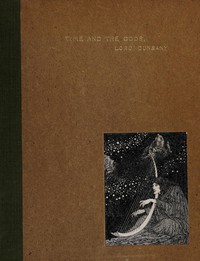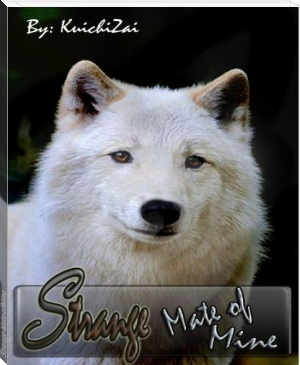Time and the Gods by Lord Dunsany (top ebook reader TXT) 📗

- Author: Lord Dunsany
Book online «Time and the Gods by Lord Dunsany (top ebook reader TXT) 📗». Author Lord Dunsany
Presently there was a stir in one of the houses, and a bat flew out of the door into the daylight, and three mice came running out of the doorway down the step, an old stone cracked in two and held together by moss; and there followed an old man bending on a stick with a white beard coming to the ground, wearing clothes that were glossed with use, and presently there came others out of the other houses, all of them as old, and all hobbling on sticks. These were the oldest people that the King had ever beheld, and he asked them the name of the village and who they were; and one of them answered, “This is the City of the Aged in the Territory of Time.”
And the King said, “Is Time then here?”
And one of the old men pointed to a great castle standing on a steep hill and said: “Therein dwells Time, and we are his people;” and they all looked curiously at King Karnith Zo, and the eldest of the villagers spoke again and said: “Whence do you come, you that are so young?” and Karnith Zo told him how he had come to conquer Time to save the world and the gods, and asked them whence they came.
And the villagers said:
“We are older than always, and know not whence we came, but we are the people of Time, and here from the Edge of Everything he sends out his hours to assail the world, and you may never conquer Time.” But the King went back to his armies, and pointed towards the castle on the hill and told them that at last they had found the Enemy of the Earth; and they that were older than always went back slowly into their houses with the creaking of olden doors. And there they went across the fields and passed the village. From one of his towers Time eyed them all the while, and in battle order they closed in on the steep hill as Time sat still in his great tower and watched.
But as the feet of the foremost touched the edge of the hill Time hurled five years against them, and the years passed over their heads and the army still came on, an army of older men. But the slope seemed steeper to the King and to every man in his army, and they breathed more heavily. And Time summoned up more years, and one by one he hurled them at Karnith Zo and at all his men. And the knees of the army stiffened, and their beards grew and turned grey, and the hours and days and the months went singing over their heads, and their hair turned whiter and whiter, and the conquering hours bore down, and the years rushed on and swept the youth of that army clear away till they came face to face under the walls of the castle of Time with a mass of howling years, and found the top of the slope too steep for aged men. Slowly and painfully, harassed with agues and chills, the King rallied his aged army that tottered down the slope.
Slowly the King led back his warriors over whose heads had shrieked the triumphant years. Year in, year out, they straggled southwards, always towards Zoon; they came, with rust upon their spears and long beards flowing, again into Astarma, and none knew them there. They passed again by towns and villages where once they had inquired curiously concerning Time, and none knew them there either. They came again to the palaces and gardens where they had waited for Time in the night, and found that Time had been there. And all the while they set a hope before them that they should come on Zoon again and see its golden eaves. And no one knew that unperceived behind them there lurked and followed the gaunt figure of Time cutting off stragglers one by one and overwhelming them with his hours, only men were missed from the army every day, and fewer and fewer grew the veterans of Karnith Zo.
But at last after many a month, one night as they marched in the dusk before the morning, dawn suddenly ascending shone on the eaves of Zoon, and a great cry ran through the army:
“Alatta, Alatta!”
But drawing nearer they found that the gates were rusted and weeds grew tall along the outer walls, many a roof had fallen, gables were blackened and bent, and the golden eaves shone not as heretofore. And the soldiers entering the city expecting to find their sisters and sweethearts of a few years ago saw only old women wrinkled with great age and knew not who they were.
Suddenly someone said:
“He has been here too.”
And then they knew that while they searched for Time, Time had gone forth against their city and leaguered it with the years, and had taken it while they were far away and enslaved their women and children with the yoke of age. So all that remained of the three armies of Karnith Zo settled in the conquered city. And presently the men of Zeenar crossed over the river Eidis and easily conquering an army of aged men took all Alatta for themselves, and their kings reigned thereafter in the city of Zoon. And sometimes the men of Zeenar listened to the strange tales that the old Alattans told of the years when they made battle against Time. Such of these tales as the men of Zeenar remembered they afterwards set forth, and this is all that may be told of those adventurous armies that went to war with Time to save the world and the gods, and were overwhelmed by the hours and the years.
The lame boy Sarnidac tended sheep on a hill to the southward of the city. Sarnidac was a dwarf and greatly derided in the city. For the women said:
“It is very funny that Sarnidac is a dwarf,” and they would point their fingers at him saying:—“This is Sarnidac, he is a dwarf; also he is very lame.”
Once the doors of all the temples in the world swung open to the morning, and Sarnidac with his sheep upon the hill saw strange figures going down the white road, always southwards. All the morning he saw the dust rising above the strange figures and always they went southwards right as far as the rim of the Nydoon hills where the white road could be seen no more. And the figures stooped and seemed to be larger than men, but all men seemed very large to Sarnidac, and he could not see clearly through the dust. And Sarnidac shouted to them, as he hailed all people that passed down the long white road, and none of the figures looked to left or right and none of them turned to answer Sarnidac. But then few people ever answered him because he was lame, and a small dwarf.
Still the figures went striding swiftly, stooping forward through the dust, till at last Sarnidac came running down his hill to watch them closer. As he came to the white road the last of the figures passed him, and Sarnidac ran limping behind him down the road.
For Sarnidac was weary of the city wherein all derided him, and when he saw these figures all hurrying away he thought that they went perhaps to some other city beyond the hills over which the sun shone brighter, or where there was more food, for he was poor, even perhaps where people had not the custom of laughing at Sarnidac. So this procession of figures that stooped and seemed larger than men went southward down the road and a lame dwarf hobbled behind them.
Khamazan, now called the City of the Last of Temples, lies southward of the Nydoon hills. This is the story of Pompeides, now chief prophet of the only temple in the world, and greatest of all the prophets that have been:
On the slopes of Nydoon I was seated once above Khamazan. There I saw figures in the morning striding through much dust along the road that leads across the world. Striding up the hill they came towards me, not with the gait of men, and soon the first one came to the crest of the hill where the road dips to find the plains again, where lies Khamazan. And now I swear by all the gods that are gone that this thing happened as I shall say it, and was surely so. When those that came striding up the hill came to its summit they took not the road that goes down into the plains nor trod the dust any longer, but went straight on and upwards, striding as they strode before, as though the hill had not ended nor the road dipped. And they strode as though they trod no yielding substance, yet they stepped upwards through the air.
This the gods did, for They were not born men who strode that day so strangely away from earth.
But I, when I saw this thing, when already three had passed me, leaving earth, cried out before the fourth:
‘Gods of my childhood, guardians of little homes, whither are ye going, leaving the round earth to swim alone and forgotten in so great a waste of sky?’
And one answered:
‘Heresy apace shoots her fierce glare over the world and men’s faith grows dim and the gods go. Men shall make iron gods and gods of steel when the wind and the ivy meet within the shrines of the temples of the gods of old.’
And I left that place as a man leaves fire by night, and going plainwards down the white road that the gods spurned cried out to all that I passed to follow me, and so crying came to the city’s gates. And there I shouted to all near the gates:
‘From yonder hilltop the gods are leaving earth.’
Then I gathered many, and we all hastened to the hill to pray the gods to tarry, and there we cried out to the last of the departing gods:
‘Gods of old prophecy and of men’s hopes, leave not the earth, and all our worship shall hum about Your ears as never it hath before, and oft the sacrifice shall squeal upon Your altars.’
And I said:—
‘Gods of still evenings and quiet nights, go not from earth and leave not Your carven shrines, and all men shall worship You still. For between us and yonder still blue spaces oft roam the thunder and the storms, there in his hiding lurks the dark eclipse, and there are stored all snows and hails and lightnings that shall vex the earth for a million years. Gods of our hopes, how shall men’s prayers crying from empty shrines pass through such terrible spaces; how shall they ever fare above the thunder and many storms to whatever place the gods may go in that blue waste beyond?’
But the gods bent straight forward, and trampled through the sky and looked not to the right nor left nor downwards, nor ever heeded my prayer.
And one cried out hoping yet to stay the gods, though nearly all were gone, saying:—
‘O gods, rob not the earth of the dim hush that hangs round all Your temples, bereave not all the world of old romance, take not the glamour from the moonlight nor tear the wonder out of the white mists in every land; for, O ye gods of the childhood of the world, when You have left the earth you shall have taken the mystery from the sea and all its glory from antiquity, and You shall have wrenched out hope from the dim future. There shall be no strange cries at night time half understood, nor songs in the twilight, and the whole of the wonder shall have died with last year’s flowers in little gardens or hill-slopes leaning south; for with the gods must go the enchantment of the plains and all the magic of dark woods, and something shall be lacking from the quiet of early dawn. For it would scarce befit the gods to leave the earth and not take with Them that which They had given it. Out beyond the still blue spaces Ye will need the holiness of sunset for Yourselves and little sacred memories and the thrill that is in stories told by firesides long ago. One strain of music, one song, one line of poetry and one kiss, and a memory of one pool with rushes, and each one the best, shall the gods take to whom the best belongs, when the gods go.
‘Sing a lamentation, people of Khamazan, sing a lamentation for all the children of earth at the feet





Comments (0)